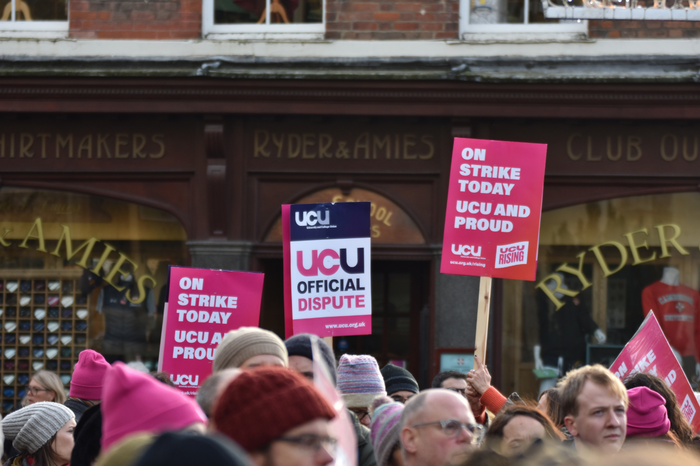Staff revolt over fears students could graduate with unmarked exams
Academic and admin staff have forced a vote over measures to soften the impact of marking boycotts, claiming that the University treats students as ‘consumers’

Over 50 staff are staging a revolt over Cambridge’s plans to mitigate future marking boycotts, over concerns that the University views students as “consumers”.
Following a review of its exam ordinances, the University proposed changes which it hoped would soften the impact of future marking boycotts. But, 54 academic and admin staff have signed a motion which calls for a vote on some of these recommendations.
Dr William Astle, a biostatistics lecturer and membership secretary of the Cambridge UCU, tabled the motion over concerns that new measures would allow students to graduate with their exams unmarked.
The University’s review of exams comes after last year’s Marking and Assessment Boycott (MAB), in which members of the University and College Union (UCU) refused to assess student work at 145 UK education institutions.
The strike action, taken during a dispute over staff pay, left students in “limbo” according to an open letter signed by 1,400 Cambridge students.
On Monday, University Council, Cambridge’s executive decision-making body, decided to put Astle’s proposed changes to the recommendations to a vote among staff.
Dr Astle told Varsity: “The Council and General Board have proposed to change the University’s exam regulations to allow students to graduate before their exams have been classified.”
“They have done this under pressure from the Office for Students, which views students as consumers,” claimed Astle. The Office for Students (OfS) is the independent body which regulates higher education in England.
He also claimed that the recommendations should have automatically been put to a staff vote, because they are “equivalent to a temporary measure” which was rejected by voting staff in 2023.
But, a member of Christ’s College wrote that they support allowing students to graduate unmarked, because it eases “students’ isolation” and improves the student “experience”.
They added that the proposed rule changes “strike a good balance between the need for flexibility in times of disruption” and the maintenance of academic standards.
When the temporary measure was proposed last year, multiple staff raised concerns that the plans could put the University in breach of its registration with the OfS.
Writing in response to these new recommendations, Gillian Evans, a philosopher and Cambridge emeritus fellow, stated that, in 2023, the OfS was alerted of a possible breach of its regulations as a result of the proposed MAB mitigations.
This rule requires universities to “operate in accordance with [their] governing documents”.
In its response to staff comments, University Council revealed that the OfS has “taken an active interest in the progress of this review”. Varsity reached out to the OfS, who confirmed their interest in the review.
Academic and administrative staff will be able to vote on the contested changes from January 21 until the end of the month.
The University of Cambridge and the Office for Students were contacted for comment.
 News / Candidates clash over Chancellorship25 April 2025
News / Candidates clash over Chancellorship25 April 2025 Interviews / Dr Ally Louks on going viral for all the wrong reasons25 April 2025
Interviews / Dr Ally Louks on going viral for all the wrong reasons25 April 2025 Music / The pipes are calling: the life of a Cambridge Organ Scholar25 April 2025
Music / The pipes are calling: the life of a Cambridge Organ Scholar25 April 2025 News / Cambridge professor paid over $1 million for FBI intel since 199125 April 2025
News / Cambridge professor paid over $1 million for FBI intel since 199125 April 2025 Arts / Plays and playing truant: Stephen Fry’s Cambridge25 April 2025
Arts / Plays and playing truant: Stephen Fry’s Cambridge25 April 2025






